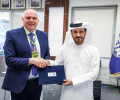A Just Transition for Africa Sustainable Innovation Series event takes place in Rwanda
FIA General Assemblies week in Kigali, Rwanda, was the setting for the FIA’s latest Sustainable Innovation Series event.

Exploring the concept of a ‘just transition’ – an approach that not only seeks to mitigate the environmental impact of automobile manufacturing and usage, but also ensures that this transformation is equitable, inclusive, and beneficial to all stakeholders involved – the forum heard from Rwandan government ministers and key officials from the United Nations, among others.
In her opening remarks, Hon. Minister of Environment of Rwanda Dr Valentine Uwamariya said she wants her country to lead by example in its pursuit of reducing greenhouse gas emissions caused by the transport industry.
She acknowledged the FIA’s efforts in this space, praising it for having “championed critical projects worldwide”, which are “benefitting millions across the globe”.
FIA President Mohammed Ben Sulayem said “Sustainability is a core element of all the work we do in the FIA but it’s not just an element, it’s a responsibility. In sport and mobility we are constantly striving to create a greener future,” adding that the FIA is “part of the solution”.
Rwanda Automobile Club President Christian Gakwaya added that he believed “Africa could be the next reference in sustainable mobility.”
The first panel focused on the topic of a just transition towards net zero road transport in Africa. Hon. Minister of Infrastructure of Rwanda Dr Jimmy Gasore explained how his government is investing in sustainable transport to achieve net zero emissions. It removed import duties and VAT for electric vehicles in 2022 and has mandated that all new motorcycle taxis must be electric from January 2025.
He added: “Buses are catching up and we are also promoting non-motorised transport so every new road will have a pedestrian walkway and bicycle lane to not only promote vehicles but also walking and cycling.”
However, he underlined the importance of ensuring that “no one is left behind and no one is pushed behind” during the transition process.
FIA Foundation Executive Director Saul Billingsley spoke of the “incredible transition in Africa of demographics, urbanisation, motorisation”, while FIA Sustainability, Diversity & Inclusion Director Sara Mariani urged governments to focus on data-driven policies and “look at every solution” when considering a just transition.
African Union Commission Head of Division Transport and Mobility Eng. Eric Ntagengerwa said there needed to be a “pan-African plan for active mobility” in light of the fact there are “different policies and strategies in countries across Africa.”
United Nations Environmental Programme Head of Sustainable Mobility Unit Rob de Jong joined Akagera Business Group Sales & Marketing Director Roopak Gorajia and Rwanda Green Fund CEO Teddy Mugabo for the second session, which addressed the need to invest in green mobility by transforming the used vehicle market for an electric future.
With many markets reliant on used vehicles, the panel explored ways that economies can drive used EV adoption and support the transition to low emission options.
Mugabo said green mobility was “a solution that also turns into an opportunity that can create new jobs and a new market.”
De Jong said: “We’re witnessing an unprecedented change in the transport sector. In the next decades the whole world is going to shift to zero emissions mobility. It’s a very interesting change, something we haven’t seen in more than 100 years.”
The panel went on to discuss potential solutions – including retrofitting old motorcycles, investing in mechanics and garages, and preventing the exports of poor quality vehicles.
With tourism being a major contributor to the GDP of developing countries, the transition to sustainable tourism models can promote environmental responsibility while ensuring social equality and economic resilience was the topic of the third session.
Drawing on shared and country-specific strategies for sustainable tourism, the third panel discussion explored how community-centred and eco-conscious policies can align tourism with a just transition.
The panel was made up of Secretary General of UN Tourism Zurab Pololikashvili, Chief Technical Advisor to the Minister of Trade and Industry in Rwanda Dr Alexis Kabayiza, and Rwanda Development Board Chief Tourism Officer Irene Murerwa.
They spoke about the potential for tourism — including sport tourism — to support local livelihoods, ensure fair access to resources, protect natural and cultural assets and provide a resilient foundation for economic development.
Pololikashvili said the “future of tourism is in the African continent.” He added: “It’s still undiscovered and unknown from outside the continent but there are lots of opportunities to invest.”
Murerwa said: “You have to have ambitions but know how to articulate them because you can’t do everything at the same time. You have to take baby steps but have a clear vision but be ready to accept constructive criticism so you can push to the limits.”
The “A Just Transition for Africa” Sustainable Innovation Series event concluded with the presentation of report showcasing the impact of incentives on EV markets and adoption in Rwanda and China.
Carried out by students at the Urban School of Sciences Po as part of the FIA University and with the support of the FIA Foundation, the report suggests that China’s EV boom was largely driven by government incentives, and highlights the opportunities for similar growth within the Rwandan market.
You can read the full report here; https://www.fia.com/multimedia/publication/fia-partners-sciences-po-publish-new-report-china-and-rwanda






 Facebook
Facebook Twitter
Twitter






